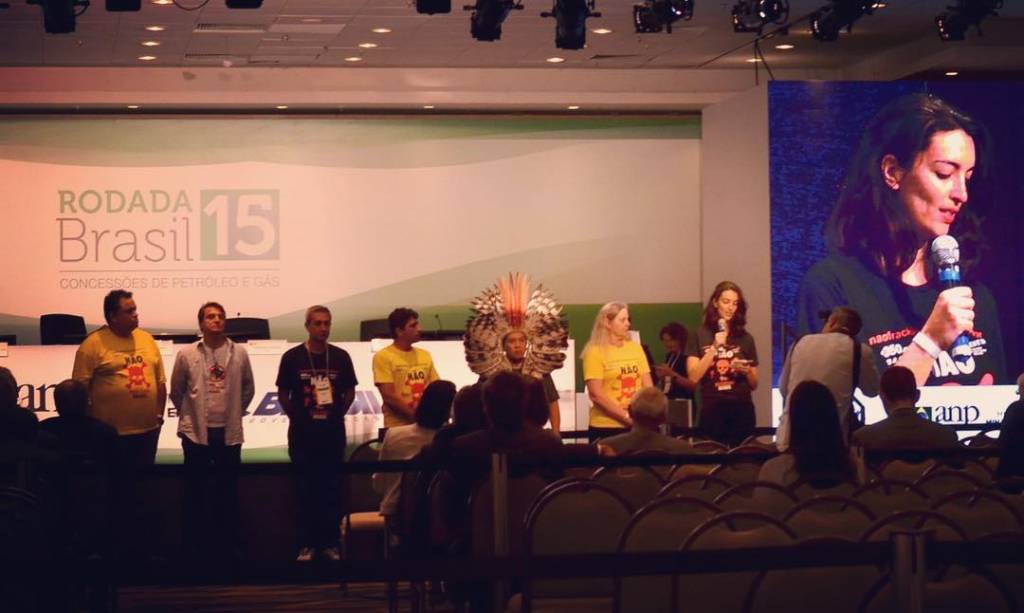
After the session that did not sell any blocks and counted on the contrary testimony of representatives of 350.org, the Brazilian government affirmed that will insist on the unconventional exploitation by fracking
Rio — Divided into two stages, the 15th Round of Bids of the Brazilian National Oil and Gas Agency (ANP), which took place this Thursday (29) in Rio de Janeiro, had two quite different results. The first, which offered the blocks offshore, was considered by the government the “best of all times”, even though two of the most important blocks were withdrawn by decision of the Union’s Court of Audit. The second one, which presented the areas onshore, was a complete failure: none of the 21 blocks, located in the Paraná and Parnaíba basins, were sold off. This represents 3.2 billion barrels equivalent and estimated 1.1 billion tons of carbon that did not go into the atmosphere.
At the opening of the afternoon session, ANP, “in order to be transparent with civil society,” honored the commitment made in February with the coordinators of the Coalition No Fracking Brazil (COESUS) and 350.org, and finally released the formal participation of civil society in the auction. The right to speak was granted to seven representatives from different states, breaking a cycle of subsequent civil participation curtailment that had been taking place for several rounds.
“For almost five years we have a common goal: the banishment of shale gas exploitation through fracking. Today, more than 380 cities in several states already prohibit environmental licensing for this type of technique. Today we are already more than 10 million people mobilized to prevent this technique from being carried out in our country. Our organizations, cities, unions and traditional communities have already said ‘no’ to hydraulic fracturing,” said Juliano Bueno de Araujo, national coordinator of COESUS and campaigner for 350.org Brazil.
Luís Adalberto Lunitti, agricultural producer and former mayor of Toledo, in the state of Paraná, the first municipality to pass anti-fracking legislation in Brazil, said that not only the population of his city, but also more than 200 municipalities from Paraná have also positioned themselves against the production of energy at any price. “We defend life, not death.”
Representing the Catholic Church, Reginaldo Urbano Argentino, member of the Diocese of Umuarama and the Mining Working Group of the National Conference of Brazilian Bishops (CNBB), said that the mobilization of the religious sector already encompasses hundreds of parishes in awareness of the risks that fracking brings to the nation. “We came to give the message to the investors and the government here, that this is not the path we want. We defend the protection of our Common Home, not the profit above people.”
Nicole Figueiredo de Oliveira, Team Leader of 350.org Latin America, spoke in English, directing her message to businessmen and other foreigners participating in the auction. “I speak on behalf of millions of people who have already banished the fracking of their cities and their lives. This is renewable energies’ moment. We need to accomplish with the Paris Accord and for this, all fossil fuels have to stay on the ground,” she said.
Even after the strong testimony of civil society and the total lack of interest of investors in the terrestrial areas, the Brazilian government categorically stated, during a press conference at the end of the Round, that they will insist on maintaining in the plans of national energy expansion the non-conventional exploration of oil and gas through the hydraulic fracturing technique.
ANP’s executive director, Décio Oddone, said the agency follows policies determined by the federal government, and that the world is in fact in transition to a low-carbon economy, but that does not mean it can dispense the use of fossil fuels in the coming decades. “Major national strategic decisions need to be made consciously, taking into account everyone’s opinion. Fracturing is a common and recurring practice in many regions of the world. So we are, rather, in favor of fracking.”
According to Márcio Félix, the Secretary of Petroleum and Natural Gas of the Ministry of Mines and Energy (MME), three to four pilot projects will be carried out in the states of Maranhão, Piauí and Minas Gerais, the latest in the São Francisco River basin. “It is hard to see that in this transition of economic model Brazil can leave behind some great wealth. Fracking was ‘villainized’. A taboo about the unconventional has been created, and we want to break it. We respect the decision of states and municipalities that do not want it, but others do. It is a pragmatic issue and not political or ideological,” he said.
In the 15th Round were offered a total of 68 blocks. Even so, the sale of the maritime blocks exceeded expectations. About 47% of the blocks were acquired, earning a record bonus of 8.14 billion BRL.